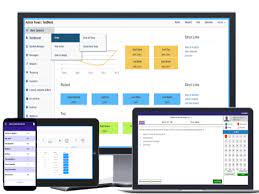Five Innovative Approaches for Assessing Students’ Knowledge

Assessing students’ knowledge is an essential part of the educational journey of students, as students’ learning capabilities helps educators gauge the effectiveness of their teaching methods and identify areas where students may need additional support. However, the old and traditional assessment techniques often fail to capture a clear understanding of students’ capabilities. In response to this challenge, educators and researchers have developed innovative approaches that can go beyond conventional methods. Using digital tools and with the help of examination software you can increase the understanding level of students with the help of project-based tasks. This article explores five innovative techniques for assessing students’ knowledge, highlighting their benefits and potential impact on education.
Gamification-Based Assessments:
One of the most exciting and effective ways to assess students’ knowledge is through gamification. By incorporating game elements into assessments, educators can create engaging and immersive experiences that motivate students to actively participate and demonstrate their understanding. Gamified assessments can include interactive quizzes, virtual simulations, and even educational video games. These methods not only evaluate students’ knowledge but also encourage teamwork, critical thinking, and problem-solving abilities. Gamification also improves student enjoyment and engagement, which results in improved retention rates and a deeper comprehension of the material.
Project-Based Assessments:
Project-based assessments shift the focus from memorization and regurgitation of information to real-world application. Students are permitted to investigate a certain subject or idea in depth and use what they learn to address real-world issues or produce practical results. This method promotes innovation, free thought, and the growth of critical abilities including investigation, analysis, and communication. Due to the freedom given to students to explore their interests within the parameters of the project, project-based assessments also encourage student ownership of learning.
Adaptive Assessments:
Adaptive assessments leverage technology to personalize the learning experience and provide tailored assessments based on students’ individual needs and abilities. These assessments use algorithms to dynamically adjust the difficulty level and content of questions based on students’ responses. Adaptive assessments offer a more precise and thorough measure of a student’s knowledge since they adjust to each student’s performance in real-time. These tests also provide rapid feedback, enabling pupils to recognise their advantages and disadvantages and concentrate on areas that need development.
Self-Assessment Strategy:
Students may make the most of the chance to actively engage in evaluating both their own knowledge and that of their classmates by using peer and self evaluation strategies. In addition to improving students’ metacognitive abilities, this practice encourages discussion and critical thinking. Students may offer constructive critique, consider opposing viewpoints, and take part in group discussions through peer and self evaluation. In order to promote responsibility and self-directed learning, teachers encourage students to review their own work, set goals, and track their progress.
Authentic Assessments:
Real-world situations that closely match the problems students will face outside of the classroom are used to test students’ knowledge in authentic assessments. Case studies, simulations, role-playing games, and performance-based evaluations are a few examples. Students should apply their knowledge and abilities to deal with difficult scenarios and make decisions in order to succeed on actual tests. This method helps students’ ability to develop critical thinking, problem-solving, and decision-making abilities. It will also prepare them for real-world issues by measuring their capacity to apply their knowledge to practical tasks.
The old assessment and evaluation techniques often fail to adequately capture the students’ knowledge and abilities. The five cutting-edge methods covered in this article—gamification-based assessments, project-based assessments, adaptive assessments, peer and self evaluations, and genuine assessments—provide instructors with fresh and useful ways to assess students’ knowledge and abilities. By adopting these strategies, educators can build an assessment process that is more engaging, personalized, and thorough, promotes deeper learning, and gets students ready for success in the dynamic, constantly-evolving world beyond the classroom.



